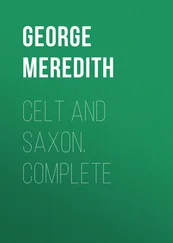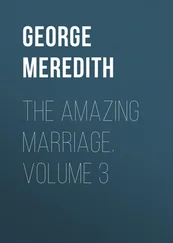George Meredith - The Amazing Marriage. Complete
Здесь есть возможность читать онлайн «George Meredith - The Amazing Marriage. Complete» — ознакомительный отрывок электронной книги совершенно бесплатно, а после прочтения отрывка купить полную версию. В некоторых случаях можно слушать аудио, скачать через торрент в формате fb2 и присутствует краткое содержание. Жанр: foreign_prose, literature_19, foreign_antique, на английском языке. Описание произведения, (предисловие) а так же отзывы посетителей доступны на портале библиотеки ЛибКат.
- Название:The Amazing Marriage. Complete
- Автор:
- Жанр:
- Год:неизвестен
- ISBN:нет данных
- Рейтинг книги:3 / 5. Голосов: 1
-
Избранное:Добавить в избранное
- Отзывы:
-
Ваша оценка:
- 60
- 1
- 2
- 3
- 4
- 5
The Amazing Marriage. Complete: краткое содержание, описание и аннотация
Предлагаем к чтению аннотацию, описание, краткое содержание или предисловие (зависит от того, что написал сам автор книги «The Amazing Marriage. Complete»). Если вы не нашли необходимую информацию о книге — напишите в комментариях, мы постараемся отыскать её.
The Amazing Marriage. Complete — читать онлайн ознакомительный отрывок
Ниже представлен текст книги, разбитый по страницам. Система сохранения места последней прочитанной страницы, позволяет с удобством читать онлайн бесплатно книгу «The Amazing Marriage. Complete», без необходимости каждый раз заново искать на чём Вы остановились. Поставьте закладку, и сможете в любой момент перейти на страницу, на которой закончили чтение.
Интервал:
Закладка:
The young lord had fair, straight, thin features, with large restless eyes that lighted quickly, and a mouth that was winning in his present colloquial mood.
‘You could have done the same? I should find it hard to forgive the man who pried into my secret thoughts,’ he remarked.
‘There they are. If one puts them to paper!…’ Woodseer shrugged.
‘Yes, yes. They never last long enough with me. So far I’m safe. One page led to another. You can meditate. I noticed some remarks on Religions. You think deeply.’
Woodseer was of that opinion, but modesty urged him to reply with a small flourish. ‘Just a few heads of ideas. When the wind puffs down a sooty chimney the air is filled with little blacks that settle pretty much like the notes in this book of mine. There they wait for another puff, or my fingers to stamp them.’
‘I could tell you were the owner of that book,’ said Lord Fleetwood. He swept his forehead feverishly. ‘What a power it is to relieve one’s brain by writing! May I ask you, which one of the Universities…?’
The burden of this question had a ring of irony to one whom it taught to feel rather defiantly, that he carried the blazon of a reeking tramp. ‘My University,’ Woodseer replied, ‘was a merchant’s office in Bremen for some months. I learnt more Greek and Latin in Bremen than business. I was invalided home, and then tried a merchant’s office in London. I put on my hat one day, and walked into the country. My College fellows were hawkers, tinkers, tramps and ploughmen, choughs and crows. A volume of our Poets and a History of Philosophy composed my library. I had scarce any money, so I learnt how to idle inexpensively—a good first lesson. We’re at the bottom of the world when we take to the road; we see men as they were in the beginning—not so eager for harness till they get acquainted with hunger, as I did, and studied in myself the old animal having his head pushed into the collar to earn a feed of corn.’
Woodseer laughed, adding, that he had been of a serious mind in those days of the alternation of smooth indifference and sharp necessity, and he had plucked a flower from them.
His nature prompted him to speak of himself with simple candour, as he had done spontaneously to Chillon Kirby, yet he was now anxious to let his companion know at once the common stuff he was made of, together with the great stuff he contained. He grew conscious of an over-anxiety, and was uneasy, recollecting how he had just spoken about his naturalness, dimly if at all apprehending the cause of this disturbance within. What is a lord to a philosopher! But the world is around us as a cloak, if not a coat; in his ignorance he supposed it specially due to a lord seeking acquaintance with him, that he should expose his condition: doing the which appeared to subject him to parade his intellectual treasures and capacity for shaping sentences; and the effect upon Lord Fleetwood was an incentive to the display. Nevertheless he had a fretful desire to escape from the discomposing society of a lord; he fixed his knapsack and began to saunter.
The young lord was at his elbow. ‘I can’t part with you. Will you allow me?’
Woodseer was puzzled and had to say: ‘If you wish it.’
‘I do wish it: an hour’s walk with you. One does not meet a man like you every day. I have to join a circle of mine in Baden, but there’s no hurry; I could be disengaged for a week. And I have things to ask you, owing to my indiscretion—but you have excused it.’
Woodseer turned for a farewell gaze at the great Watzmann, and saluted him.
‘Splendid,’ said Lord Fleetwood; ‘but don’t clap names on the mountains.—I saw written in your book: “A text for Dada.” You write: “A despotism would procure a perfect solitude, but kill the ghost.” That was my thought at the place where we were at the lake. I had it. Tell me—though I could not have written it, and “ghost” is just the word, the exact word—tell me, are you of Welsh blood? “Dad” is good Welsh—pronounce it hard.’
Woodseer answered: ‘My mother was a Glamorganshire woman. My father, I know, walked up from Wales, mending boots on his road for a livelihood. He is not a bad scholar, he knows Greek enough to like it. He is a Dissenting preacher. When I strike a truism, I ‘ve a habit of scoring it to give him a peg or tuning-fork for one of his discourses. He’s a man of talent; he taught himself, and he taught me more than I learnt at school. He is a thinker in his way. He loves Nature too. I rather envy him in some respects. He and I are hunters of Wisdom on different tracks; and he, as he says, “waits for me.” He’s patient!’
Ah, and I wanted to ask you,’ Lord Fleetwood observed, bursting with it, ‘I was puzzled by a name you write here and there near the end, and permit me to ask, it: Carinthia! It cannot be the country? You write after, the name: “A beautiful Gorgon—a haggard Venus.” It seized me. I have had the face before my eyes ever since. You must mean a woman. I can’t be deceived in allusions to a woman: they have heart in them. You met her somewhere about Carinthia, and gave her the name? You write—may I refer to the book?’
He received the book and flew through the leaves:
‘Here—“A panting look”: you write again: “A look of beaten flame: a look of one who has run and at last beholds!” But that is a living face: I see her! Here again: “From minute to minute she is the rock that loses the sun at night and reddens in the morning.” You could not create an idea of a woman to move you like that. No one could, I am certain of it, certain; if so, you ‘re a wizard—I swear you are. But that’s a face high over beauty. Just to know there is a woman like her, is an antidote. You compare her to a rock. Who would imagine a comparison of a woman to a rock! But rock is the very picture of beautiful Gorgon, haggard Venus. Tell me you met her, you saw her. I want only to hear she lives, she is in the world. Beautiful women compared to roses may whirl away with their handsome dragoons! A pang from them is a thing to be ashamed of. And there are men who trot about whining with it! But a Carinthia makes pain honourable. You have done what I thought impossible—fused a woman’s face and grand scenery, to make them inseparable. She might be wicked for me. I should see a bright rim round hatred of her!—the rock you describe. I could endure horrors and not annihilate her! I should think her sacred.’
Woodseer turned about to have a look at the man who was even quicker than he at realizing a person from a hint of description, and almost insanely extravagant in the pitch of the things he uttered to a stranger. For himself, he was open with everybody, his philosophy not allowing that strangers existed on earth. But the presence of a lord brought the conventional world to his feelings, though at the same time the title seemed to sanction the exceptional abruptness and wildness of this lord. As for suspecting him to be mad, it would have been a common idea: no stretching of speech or overstepping of social rules could waken a suspicion so spiritless in Woodseer.
He said: ‘I can tell you I met her and she lives. I could as soon swim in that torrent or leap the mountain as repeat what she spoke, or sketch a feature of her. She goes into the blood, she is a new idea of women. She has the face that would tempt a gypsy to evil tellings. I could think of it as a history written in a line: Carinthia, Saint and Martyr! As for comparisons, they are flowers thrown into the fire.’
‘I have had that—I have thought that,’ said Lord Fleetwood. ‘Go on; talk of her, pray; without comparisons. I detest them. How did you meet her? What made you part? Where is she now? I have no wish to find her, but I want thoroughly to believe in her.’
Читать дальшеИнтервал:
Закладка:
Похожие книги на «The Amazing Marriage. Complete»
Представляем Вашему вниманию похожие книги на «The Amazing Marriage. Complete» списком для выбора. Мы отобрали схожую по названию и смыслу литературу в надежде предоставить читателям больше вариантов отыскать новые, интересные, ещё непрочитанные произведения.
Обсуждение, отзывы о книге «The Amazing Marriage. Complete» и просто собственные мнения читателей. Оставьте ваши комментарии, напишите, что Вы думаете о произведении, его смысле или главных героях. Укажите что конкретно понравилось, а что нет, и почему Вы так считаете.












